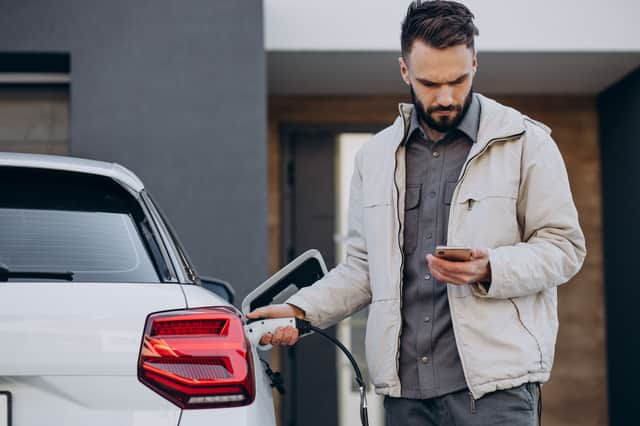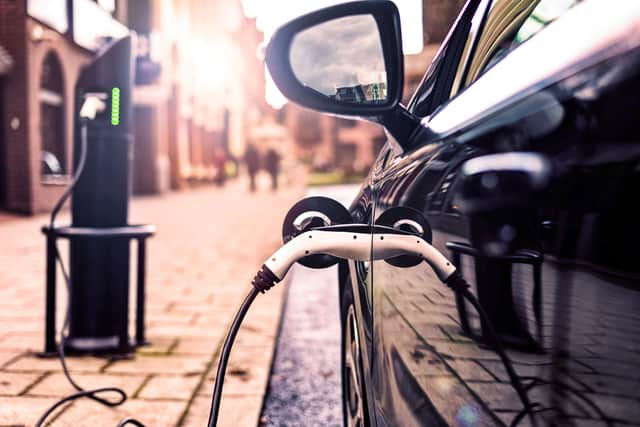EV smart charging: how drivers could save £1,000 on bills according to government


Electric car owners could save up to £1,000 a year under a government plan to promote the use of smart charging.
The Electric Vehicle Smart Charging Action Plan aims to ramp up the use of smart chargers in domestic and public settings in an effort to reduce the impact of EV charging on the electricity grid. It includes the installation of “smart” lampposts for public charging and programmes to allow domestic devices to integrate into the energy grid.
Advertisement
Hide AdAdvertisement
Hide AdThe plan from the Department for Business, Energy and Industrial Strategy (BEIS) and Ofgem sets out steps to make smart charging the norm at home and work by 2025, as well as the preferred method of long-duration public charging.
Some £16 million in funding will go towards technologies including a smart street lamppost capable of charging EVs and sharing power back to the grid, and projects that will enable domestic appliances such as EV charge points, heat pumps and batteries to integrate into a smarter energy system. The plan is also examining ways for drivers to make money by selling energy stored in their EVs back to the grid.
Energy and climate minister Graham Stuart said: “We want to make smart charging an easier choice for drivers of electric vehicles, whether that is charging on the driveway, at the workplace, or parked on the street.
“To do that we need to build new network infrastructure at pace, using the latest available technologies.Today’s plan sets out how we will work with Ofgem and industry to kickstart the market for smart charging, which we are backing it up with £16m in innovation funding.
Advertisement
Hide AdAdvertisement
Hide Ad“This will let people take control of their energy usage, in the most convenient and low-cost way.”
The BEIS said the technology could even help reduce electricity prices for all consumers by balancing energy usage.


Smart chargers are internet connected devices which can be monitored and controlled via a mobile app, allowing users to start and stop charging or set a charging schedule remotely. Most home chargers now on sale include this capability.
The online connectivity allows smart chargers to delay an EV’s charging to avoid peak demand periods and to take advantage of cheaper overnight energy tariffs. The plan by the BEIS and Ofgem suggests even a low-use driver could save £200 a year while a high-mileage motorist could save up to £1,000.
Advertisement
Hide AdAdvertisement
Hide AdSeveral energy companies have previously offered time-of-use or overnight EV tariffs that charge a fraction of the daytime rate. However, there are currently no such schemes open to new customers.
Under the new plan, the next generation of bidirectional chargers could also allow drivers to make money from energy stored in their vehicle. Such devices allow cars with vehicle-to-grid systems such as some from Hyundai, Kia and MG to send power back to the home or electricity grid in times of high demand. This could allow drivers to fill their batteries when energy costs are low and sell it back to the grid at a higher price at peak times.
Neil Kenward, Ofgem director for strategy and decarbonisation, said: “This latest innovative plan will help to maximise the benefits of smart charging, offer vital savings to consumers and reduce the overall cost of energy by seizing the opportunities to use batteries to both power homes and fuel the wider grid.”
The RAC recently revealed that EV drivers using rapid or ultra-rapid public chargers are paying more per mile than those driving a petrol car. It found the average price at a rapid charger has risen by nearly 26p per kilowatt hour (kWh) since May 2022, reaching 70.3p per kWh.
Advertisement
Hide AdAdvertisement
Hide AdRAC EV spokesperson Simon Williams said: “Any innovation that can help reduce the cost of charging an EV is very welcome. While it remains the case that charging an EV at home is still far cheaper than driving a petrol or diesel car that gap disappears when using the fastest public chargers. We hope the Government starts to tackle this issue as it has the potential to slow down the transition to zero-emission motoring, particularly for those who may never be able to charge at home.”
Edmund King, AA president, said: “More incentives are needed to help people switch electric vehicles so smart charging with the possibility of ‘cashback’ would be welcome. More than 70% of drivers have been so shocked by the surge in electricity prices that it has tainted their view of EVs. One in 10 say the hike in electricity costs is the main reason for being put off switching to an EV.”
